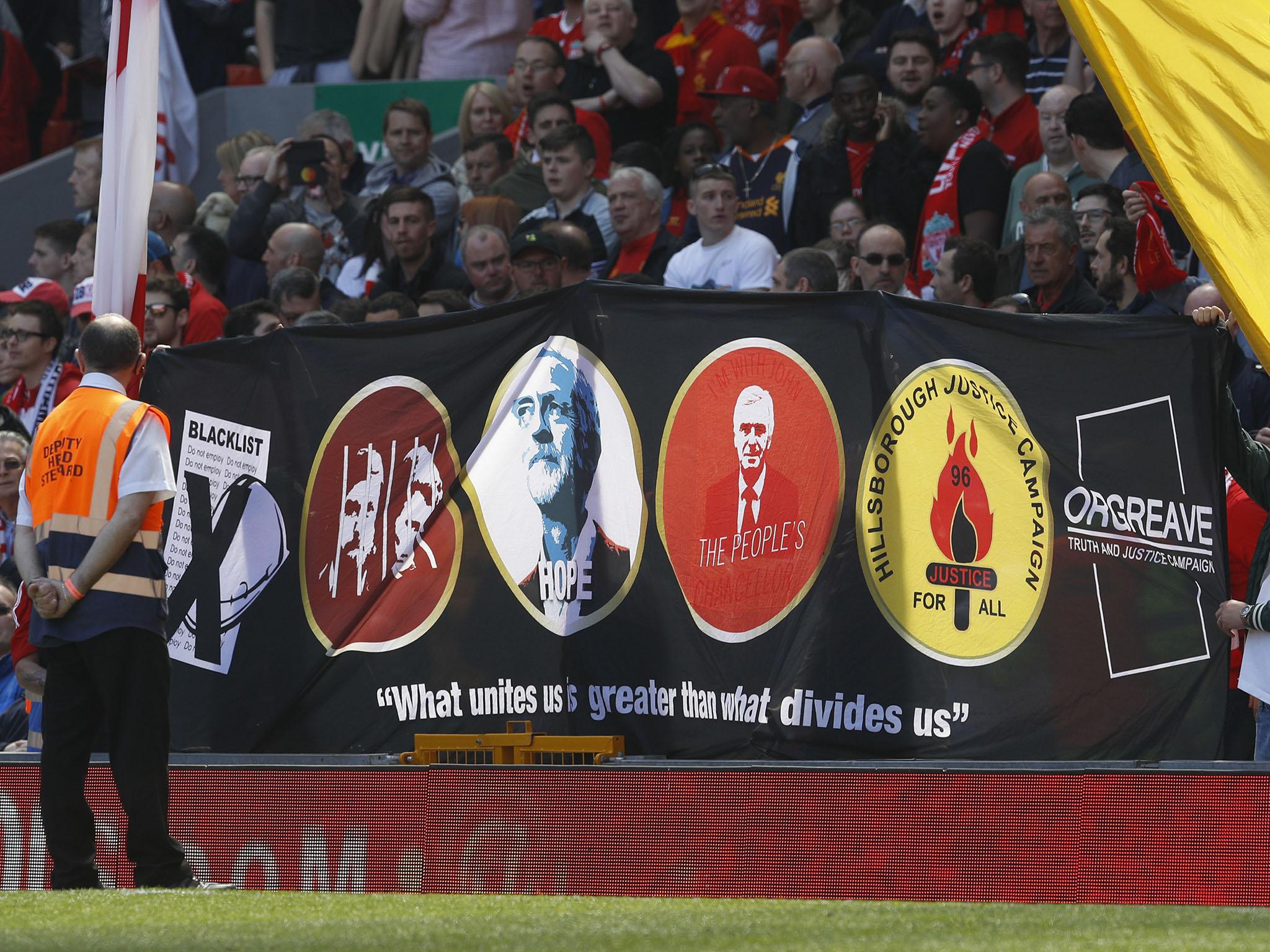This is what Labour could learn from Corbyn’s unlikely success in Liverpool
There is an entire generation of white working class people who have never been exposed to The Sun, a unique experiment which, if replicated elsewhere could change the British political landscape

At Anfield on Sunday during Liverpool’s match against Southampton, a prominent banner on the front of the Kop featured the Hillsborough Justice, Shrewsbury 24 and the Orgreave Truth and Justice campaigns. Somewhat more incongruously, it also featured the faces of shadow chancellor John McDonnell and Labour leader Jeremy Corbyn. Roy Bentham, who helped organised the banner, spoke of a “working class people” in a “historically working class city”.
Today, Liverpool has become a Labour stronghold, but it remains demographically unlikely Corbyn territory. According to Professor Tim Bale’s analysis of Labour members who joined after May 2015 (and overwhelmingly support Corbyn) fully 78 per cent are in the ABC1 social classes, only 25 per cent are trade unionists, and one third are from Southern England.
It makes little sense in terms of the city’s history too. Corbyn represents the abstemious, nonconformist tradition within the labour movement: he is a teetotaller who has criticised after work drinking and a vegetarian who banned McDonald’s from the Labour Party conference. This sort of cultural puritanism has, to put it mildly, never been popular on Merseyside.

Unlike areas such as South Wales, West Yorkshire and the Durham coalfield, with their chapels, male voice choirs and brass bands, in Liverpool, casualised labour, irregularity of work, and sectarian strife produced a nihilistic culture based around the pub, the racecourse and the football ground. To a large extent this spirit survives to this day, and is best summed up by adopted Scouser Jan Molby: “In Liverpool, when it’s Tuesday night and you’re out having a bevvy, no one’s thinking about Wednesday morning.”
Counter to Corbyn’s internationalism, Liverpool is a city with a nationalist and racist past. Photographs of Liverpool fans away in Europe in the 70s and 80s feature a multitude of St Georges’ Crosses and Union Flags, and the absence of prominent black players in Liverpool and Everton’s squads until the end of the 1980s was no coincidence.
When I raised this with Len McCluskey, proud Scouser and former Liverpool season ticket holder, he blamed racial tensions on National Front agitators. However, journalist and Liverpool fan Brian Reade claimed that prior to Liverpool signing John Barnes in 1987, he would “dread seeing black players run out for the opposition”, in anticipation of the abuse that would be hurled at them. He also noted that when Kenny Dalglish was trying to sign Barnes, “the vilest of graffiti was daubed on Anfield’s walls” and that “once again we found ourselves playing the National Front card to excuse the ugliness of our own people”.
Since those dark days, the boycott of The Sun over its coverage of the Hillsborough disaster has resulted in a self-conscious rejection of many of the supposed values of that paper. In Liverpool today, there is an entire generation of white working class people who have never been exposed to The Sun, a unique experiment which, if replicated elsewhere could change the British political landscape. But many Scousers (especially the young) suffer from a false memory of this transformation, and feel that their internationalism, anti-Monarchism, and xenophilic attitudes contributed to their rejecting The Sun, rather than the other way around; before Hillsborough the paper had a circulation of 55,000, making it the most read daily on Merseyside.
In addition to the establishment cover-up of Hillsborough, years of neglect by Conservative governments and the painful experiences of deindustrialisation, culminating in the dockers' strike in the 1990s, have all left their mark on the Scouse psyche. These developments have resulted in a powerful desire for social justice and a deep mistrust of both the Tory Party and mainstream narratives emanating from the national press.
While Corbyn and Liverpool are odd bedfellows, Labour can learn from Scouse culture. One of the reasons they are in such dire straits is that Corbynism is focused tightly on young, well-educated white people, but this is a very narrow constituency. The family and faith-based, communitarian, often nihilistic left-wing culture of Liverpool is a better model for the demographics of the UK today and the gig economy than a labour culture founded on the chapels and miners’ lodges of a century ago, but he may need to bypass some parts of the press to get to them.
Join our commenting forum
Join thought-provoking conversations, follow other Independent readers and see their replies
Comments
Bookmark popover
Removed from bookmarks